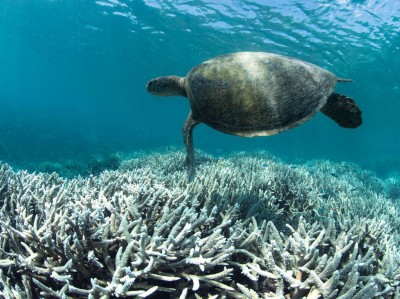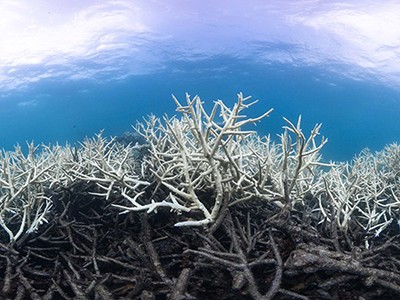No one denies the cascade of climate-induced coral bleaching that devastated huge portions of the Great Barrier Reef in 2016, nor the subsequent bleaching. No one questions the Queensland government’s 2019 report (see go.nature.com/3ckg) that the reef’s condition near the shore is poor.
Yet last month, the World Heritage Committee of the United Nations organization UNESCO caved to lobbying from the Australian government — pressured by fossil-fuel, agricultural and mining interests — and kept the Great Barrier Reef off its list of ecosystems ‘in danger’. In my view, this decision is wrong, factually and strategically. It leaves both UNESCO and Australia weaker against the climate crisis.
I study the governance of approximately 250 ecosystems with World Heritage status because of their outstanding value to humanity — including attempts to curtail runaway industrial development of Vietnam’s Ha Long Bay and overzealous urbanization along Florida’s Everglades wetlands.
There are benefits to an in-danger listing: the Belize Barrier Reef Reserve System was placed on the list in 2009. The World Heritage Fund then provided technical and financial assistance for its restoration. By 2018, mangrove coverage was restored nearly to 1996 levels, with clearing in protected areas almost entirely curtailed. The whole maritime zone was under a moratorium on oil and gas production. Restoration work is ongoing, but the Belize reef is no longer on the list.
This July, UNESCO proposed to list the Great Barrier Reef as in danger owing to severe coral bleaching, poor water quality and inaction on climate change.
In arguing against the listing, the Australian government did not directly deny the reef’s parlous state, but did play down its condition. The government also argued that the listing would decrease tourism revenues, that Australia had too little time to respond and should not be held responsible for global change, and that UNESCO should not supersede national sovereignty on climate-change policy.
Australian environment minister Sussan Ley lobbied committee members from more than a dozen countries to override UNESCO’s recommendation. Australia avoided an in-danger listing in 2015 using similar tactics and by touting a sustainability plan. The following year saw the worst coral bleaching in the world’s history.
But changes are in the wind. After back-to-back coral bleaching in 2016–17 and the tragic 2020 bush fires, more Australian voters, industries and even conservative politicians are calling for strong efforts against climate change.
Accepting an in-danger listing for the reef could tip the balance past gridlock. More than 70% of Australians think that formally acknowledging the reef’s endangered state would spur action. In 1993, former US president Bill Clinton’s administration requested that UNESCO certify Florida’s Everglades as in danger. This helped to bring industry opponents on board to better manage coastal development. Had the Great Barrier Reef been listed as in danger in 2015, fossil-fuel developments in the catchment areas draining into the reef would have struggled to get approval.
Australia’s most conservative politicians will argue that avoiding an in-danger listing in 2022 is necessary to boost economic development. But this will embarrass Australia later. As more marine heating occurs globally, Australia will struggle to defend its inaction on climate to the UN climate-change conference in November and to the World Heritage Committee next year. Even the Queensland Tourism Industry Council has said keeping the reef’s status under the spotlight is a “call to the world to do more on climate change”.
And undercutting the listing undermines the purpose of the World Heritage Committee. Since 1972, 41 ecosystems have been considered for the in-danger list — 27 of them more than once — but not officially inscribed, even though UNESCO and its advisory body had assessed these ecosystems as threatened, or more threatened than those already listed. The number of sites on the list has declined by almost one-third since 2001, although threats continue to grow and there are more ecosystems on the overall World Heritage List.
However, destabilizing strategies are mainly due to a small group of nations — including countries in the Organisation for Economic Co-operation and Development, such as Australia and Spain. World Heritage status and in-danger listings often work as intended: the managers of 73% of sites do comply with their responsibilities.
Concerned observers are helping the World Heritage Committee to protect itself from political manipulation. In February 2020, a consortium of 76 organizations and individuals petitioned UNESCO to consider climate change in its World Heritage decisions. A nascent international network known as World Heritage Watch hopes to provide more oversight and monitoring of self-interested states. Ecologists and non-profit organizations are using remote sensing and citizen science to track and expose degradation of protected areas (see go.nature.com/2xn1) and hold governments accountable.
UNESCO and its World Heritage Committee grasp the stakes. A new draft policy clearly states that climate-related degradation of a World Heritage Area can be used as the basis for in-danger listing; it will probably be ratified later this year at the UNESCO General Assembly. This policy will shine a harsh light on the intensifying geopolitics of climate change. Advanced economies, such as Australia, with high per-capita emissions but limited climate action, will need to find alternative ways to protect resources and jobs.
"accept" - Google News
August 18, 2021 at 04:07PM
https://ift.tt/2XDEFUD
Great Barrier Reef: accept 'in danger' status, there's more to gain than lose - Nature.com
"accept" - Google News
https://ift.tt/2YsXkRf
https://ift.tt/3d2Wjnc
Bagikan Berita Ini
















0 Response to "Great Barrier Reef: accept 'in danger' status, there's more to gain than lose - Nature.com"
Post a Comment